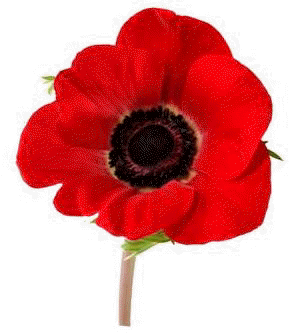| Lt. Col. John McCrae |
While having lunch at our favorite Silvana restaurant the other day, we picked up the Java Jabber, the entertainment and advertising folder found on the tables of many local eating places. Instead of the usual humorous items, this issue’s front page featured the classic poem, In Flanders Fields, written during World War I.
Hank had me copy it on a napkin (the only writing paper available at the moment). It’s Hank’s self-appointed task to share one-liners or jokes for the amusement of our fitness class. This morning, in honor of Veteran’s Day, he read the poem, and there were tears:
In Flanders Fields
Lieutenant Colonel John McCrae, MD (1872-1918), Canadian Army
In Flanders Fields the poppies blow
Between the crosses row on row,
That mark our place; and in the sky
The larks, still bravely singing, fly
Scarce heard amid the guns below.
We are the Dead. Short days ago
We lived, felt dawn, saw sunset glow,
Loved and were loved, and now we lie
In Flanders fields.
Take up our quarrel with the foe:
To you from failing hands we throw
The torch; be yours to hold it high.
If ye break faith with us who die
We shall not sleep, though poppies grow
In Flanders fields.
Lt. Col. John McCrae was a medical doctor with the Canadian Army during the terrible battle in the Ypres Salient in the Dutch-speaking north of Belgium (Flanders), early in 1915.
In military language, a salient is a part of the battlefield that projects into enemy territory. The troops occupying the salient are surrounded by the enemy (n this case the Germans) on three sides, making them particularly vulnerable. This piece of real estate was the location of five battles of Ypres, some of the biggest battles of World War I, fought over the period from 1914 until the Germans were pushed back for good in 1918.
During these battles, Britain, France, Canada, and Belgian armies combined their defensive efforts against the German incursions and it was here that trench warfare began in the mostly flat salient as both sides “dug in” around the line. The Second Battle of Ypres in 1915 saw the first use of poison gas and terrible injuries and loss of life,
Lt. Col. McCrae, a surgeon attached to the 1st Field Artillery Brigade, had spent seventeen straight days treating injured men: Canadians, British, Indians, French, and Germans, while the battle raged around him. The screams, blood, and suffering were hellish and impossible to get used to. One death particularly affected McCrae. A young friend and former student had been blown apart in a shell burst. McCrae had helped to gather the body parts and bury them in a cemetery outside McCrae’s dressing station. Then, because of the chaplain’s absence, he performed the funeral ceremony.
The next day, McCrae sat down to rest on the back of an ambulance parked near his duty station. He watched the breeze toss the wild poppies growing in the nearby cemetery, and he began to scribble the lines of a poem in his notebook.
A young soldier was delivering mail that day when he spotted McCrae. He watched quietly as McCrae wrote. The doctor’s eyes strayed to his friend’s grave now and then, but he went on writing. Five minutes later, he put down his pencil. He took his mail from the soldier, Sergeant-Major Cyril Allinson, and without a word, handed his notebook to the young man. Allinson was moved by what he read. “The poem was exactly an exact description of the scene in front of us both,” he later wrote.
McCrae also showed the poem to a nurse he worked with, Clare Gass of Nova Scotia. She copied the words into her diary and urged him to offer it for publication. Perhaps it was her encouragement that resulted in its publication in the English paper, Punch.
Generations of school children have memorized the poem. It carries a powerful message as we remember our military service people this Veteran’s Day. There is a torch for us to hold high.


No comments:
Post a Comment
Comments? Click here.